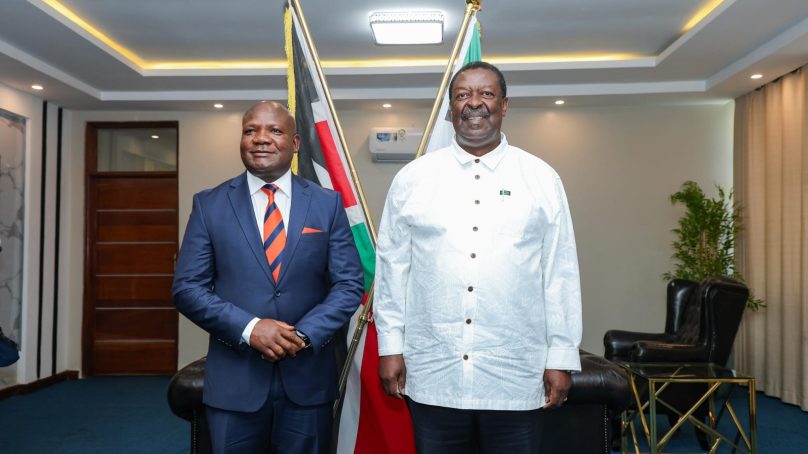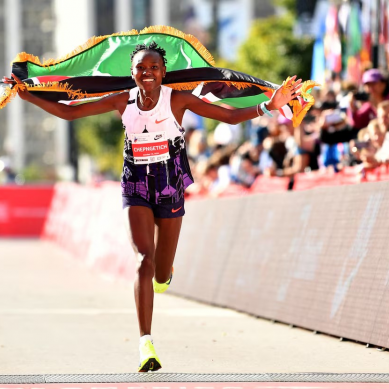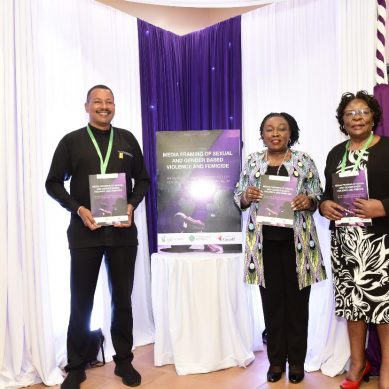
Kenya is on the precipice of a constitutional moment unless the executive, judiciary and legislature close ranks and reconstitute the Independent Electoral and Boundaries Commission (IEBC), which has been in abeyance since the contested presidential poll outcome in 2022.
Consequently, western Kenya leadership from Kakamega, Bungoma, Busia, Vihiga, Kisumu and Trans Nzoia counties has kicked off a campaign to functionalise the agency that slipped into the doldrums following controversial exit of the four commissioners after the 2022 presidential poll, while two others left at the expiry of their tenures.
On a day President William Ruto and former President Uhuru Kenyatta met for first time since the latter handed over power to his former deputy in 2022, leaders across western Kenya launched a scathing attack on individuals in high echelons of power they accuse of being the bottleneck to speedy resolution of the IEBC impasse.
After the meeting, former President Kenyatta’s office released a statement that lay emphasis on reconstitution of the elections body.
“Top among these issues are, transparency and accountability. He stressed that in a democracy, sector practitioners need to be consulted continuously and sustainably because they usually have solutions themselves. Further, to entrench Kenya’s democratic credentials there is urgent need to reconstitute the IEBC in a similar transparent manner. Further continuous engagements are the solution to an all- inclusive democratic process. Even good ideas that are not implemented transparently will create suspicion and mistrust,” the statement said.
Principal Cabinet Secretary Musalia Mudavadi kicked off the storm when he warned that the current impasse over IEBC puts Kenya in a constitutional crisis with far-reaching political, social and economic consequences. Mudavadi described the slew of suits filed in court as predetermined gerrymandering to create a constitutional crisis they would take advantage of to unseat the Kenya Kwanza government regime by plunging the country into a constitutional.
Kenya’s ruling Kenya Kwanza (Kenya First) coalition is made up of 12 political parties that teamed up with President Ruto’s United Democratic Alliance to vie for the 2022 general election. The dysfunctionality of IEBC is blamed on the standoff between Kenya Kwanza and its main rival Azimio la Umoja that is also made up of mosaic of parties consisting of the Orange Democratic Movement (ODM), Wipe Democratic party and Jubilee Party, among others.
The law that creates IEBC provides: “The commission shall, after every general election, review its operations and make the necessary changes required to make its operations more efficient, effective, transparent and accountable. The review shall be completed within eighteen months after every general election and the commission shall publish the report in the Gazette and submit the report to parliament.”
The commission has not met as required by law since the August 9, 2022 elections, because among other things, it lacks a chair and assistant chair, and does not have mandatory quorum to make any decision legal and binding.
The impasse Kenya finds itself has remained unaddressed for nearly three years despite the known political and constitutional ramifications. While political parties bear part of the blame, President Ruto has been accused by the opposition led by former Vice President Kalonzo Musyoka and former defence minister Eugene Wamalwa of fomenting the situation to enable him to extend his tenure unconstitutionally when his first terms expires in 2027.
On December 9, PCS Mudavadi and Kakamega Governor Fernandez Barasa returned the favour by laying the blame of the dysfunctionality of IEBC the opposition for, in their words, gerrymandering to create constitutional crisis.
The law says, “At least six months before the lapse of the term of the chairperson or member of the commission or within fourteen days of the declaration of a vacancy in the office of the chairperson or member of the commission under the constitution or this Act, the president shall appoint a selection panel consisting of nine persons for the purposes of appointment of the chairperson or member of the commission.”
At issue in the current impasse is the appointment of the selection panel, which is being contested in court – further delaying the reconstitution of the panel to pave way to turn vet IEBC commissioner candidates.
The law provides that the election agency reviews electoral boundaries every 8-12. The next review has fallen behind by more than 12 months, a situation that has resulted in some constituencies and wards being underrepresented especially in densely populated urban areas like Nairobi, Mombasa, Kisumu, Nakuru, Kakamega and Eldoret cities, according to former ruling party Kanu spokesman Fred Okang’o.
In the absence of a functioning IEBC, Okang’o said during a Citizen Television station talk-show that five constituencies that lost MPs via death, election petition or appointment to the cabinet cannot hold by-election to election replacements. The same applies to roughly 17 wards at the grassroots that are not represented in regional assemblies.
“Subject to the Constitution, matters to be addressed in the delimitation of electoral boundaries are: review of the names and boundaries of constituencies; review of the number, names and boundaries of wards; re-distribution of wards affected by any changes in the boundaries of constituencies; and ensuring that the number of inhabitants in each constituency and ward is as nearly as possible, equal to the population quota as provided for by Article 89(5) of the Constitution,” the law says.
According to Mudavadi elements opposed to IEBC reconstitution harbour an ulterior motive that is injurious to the sovereignty and political stability of Kenya, besides portraying President Ruto as a failure.
“If President William Ruto and Raila Odinga have agreed to work together through a broad-based government, then who are you to stand in the way? Kenya Kwanza administration is on the forefront in ensuring that the ODM leader clinches the African Union chairmanship early next year and now the country is forging forward on a development path as per the aspirations of President Ruto’s manifesto.
Mudavadi pointed out that failure by opposition to nominate a representative to the IEBC selection panel and hold talks to resolve their inhouse disagreements is holding the country at ransom. In the current impasse, the nomination of lawyer Koki Muli is being contested un court on the ground on her political party affiliation. The law requires that the nominating party be represented in parliament.
According to Mudavadi, it is important for to have a functioning IEBC ahead of 2027 that will give the aggrieved parties a chance to exercise their democratic and political right through the ballot.
“Let us be sober enough and agree to constitute the election body as the 2027 polls nears, as this will give every Kenya the freedom and right to execute their rightful mandate as per the constitution. Right now the Kenya Kwanza administration is steadily focusing on bringing about economic development two years down the election line and that is what Kenyans expect from us, not endless political bickering and hoodwinking the government,” Mudavadi said.
Also speaking at the Digihub launch at Kakamega county polytechnic and later at the launch of Safe Homes Safe Spaces at Bukhungu Stadium, Kakamega Governor Fernandez Barasa supported prime cabinet secretary’s sentiments and called for the withdrawal of cases filed against IEBC reconstitution.
“Why would any right thinking Kenyan run to the courts to block the reconstitution process that has been the talk and desire of every Kenyan? We know there is a few disgruntled individuals who feel left out of the broad-based government made up of President William Ruto and (former Prime Minister) Raila Odinga with his lieutenants. We are in support of that cordial working relationship that will see Odinga being elected the next African Union chairman, and we stand in solidarity with the Kenya Kwanza government as far as development of both counties and national projects is concerned,” the governor observed.
Barasa said it was time for the leaders to start thinking development and stop mudslinging the government in place and instead wait for the 2027 polls to vie for positions of their choice.
- A Tell report / By Isaac Wakhungu Andanje







